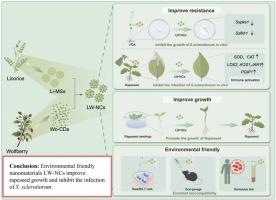甘草-枸杞衍生纳米材料通过激活ja介导的免疫反应增强油菜菌核菌抗茎腐病能力
IF 6.2
1区 农林科学
Q1 AGRICULTURAL ENGINEERING
引用次数: 0
摘要
由于缺乏抗性种质,由菌核菌(sclerotinia sclerotiorum)引起的菌核病(sclerotinia stem rot, SSR)已成为甘蓝型油菜(Brassica napus L.)生产中危害最大的病害。纳米生物技术最近被认为是一种减少农药使用的可持续作物保护方法。本研究合成并表征了一种新型的蓝绿荧光纳米复合物(LW-NCs),其抗氧化活性比单独的甘草或枸杞提取物强。lw - nc在不影响光合效率的情况下促进了油菜幼苗的生长。体外抑菌实验表明,在200 ppm浓度下,lw - nc显著抑制菌核病菌的生长。转录组学和代谢组学分析表明,叶面施用LW-NCs提高了油菜JA含量、SOD和CAT活性,最终增强了油菜对菌核病菌的耐受性。此外,毒性实验表明LW-NCs具有良好的生物相容性。上述结果表明,施用低分子量ncs不仅可以提高油菜籽的抗病性,而且有助于减少农药对人体健康的危害,确保农药在农业应用中的安全性。本文章由计算机程序翻译,如有差异,请以英文原文为准。

Licorice-wolfberry derived nanomaterials enhance sclerotinia stem rot resistance by activating JA-mediated immune response in rapeseed
Due to the lack of resistant germplasm, sclerotinia stem rot (SSR) caused by S. sclerotiorum (Sclerotinia sclerotiorum) has become the most destructive disease in rapeseed (Brassica napus L.) production. Nanobiotechnology has recently been considered as a sustainable approach for crop protection by reducing pesticide use. In this study, a novel blue-green fluorescent nanocomplex derived from licorice and wolfberry (LW-NCs) was synthesized and characterized, exhibiting stronger antioxidant activity compared with licorice or wolfberry extracts alone. LW-NCs promoted the growth of rapeseed seedlings without affecting photosynthesis efficiency. In vitro antifungal assays revealed that LW-NCs significantly inhibited the growth of S. sclerotiorum at a concentration of 200 ppm. Transcriptomic and metabolomic analyses demonstrated that foliar application of LW-NCs increased the JA content and the activities of SOD and CAT in rapeseed, ultimately enhancing the tolerance of rapeseed to S. sclerotiorum. In addition, toxicity experiments have demonstrated that LW-NCs possess excellent biocompatibility. These results indicated that the application of LW-NCs can not only improve the disease resistance of rapeseed, but also help reduce the harm of pesticides to human health, ensuring the safety of them for agricultural applications.
求助全文
通过发布文献求助,成功后即可免费获取论文全文。
去求助
来源期刊

Industrial Crops and Products
农林科学-农业工程
CiteScore
9.50
自引率
8.50%
发文量
1518
审稿时长
43 days
期刊介绍:
Industrial Crops and Products is an International Journal publishing academic and industrial research on industrial (defined as non-food/non-feed) crops and products. Papers concern both crop-oriented and bio-based materials from crops-oriented research, and should be of interest to an international audience, hypothesis driven, and where comparisons are made statistics performed.
 求助内容:
求助内容: 应助结果提醒方式:
应助结果提醒方式:


